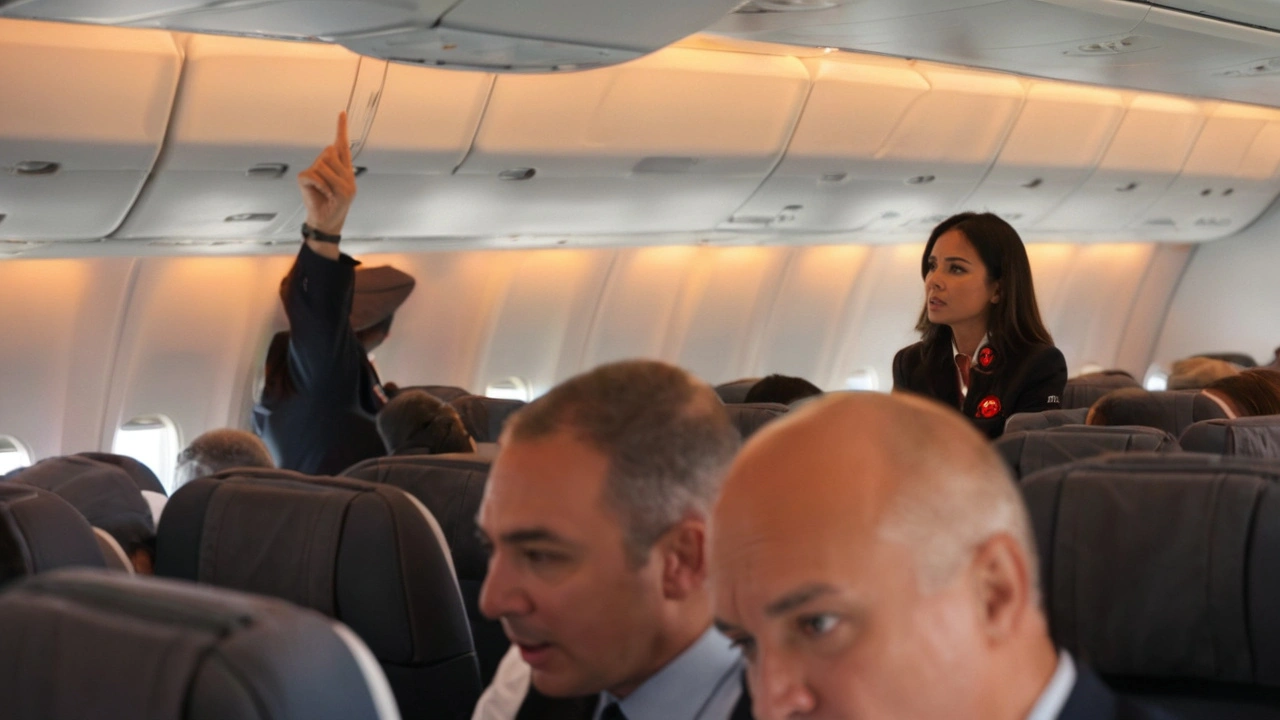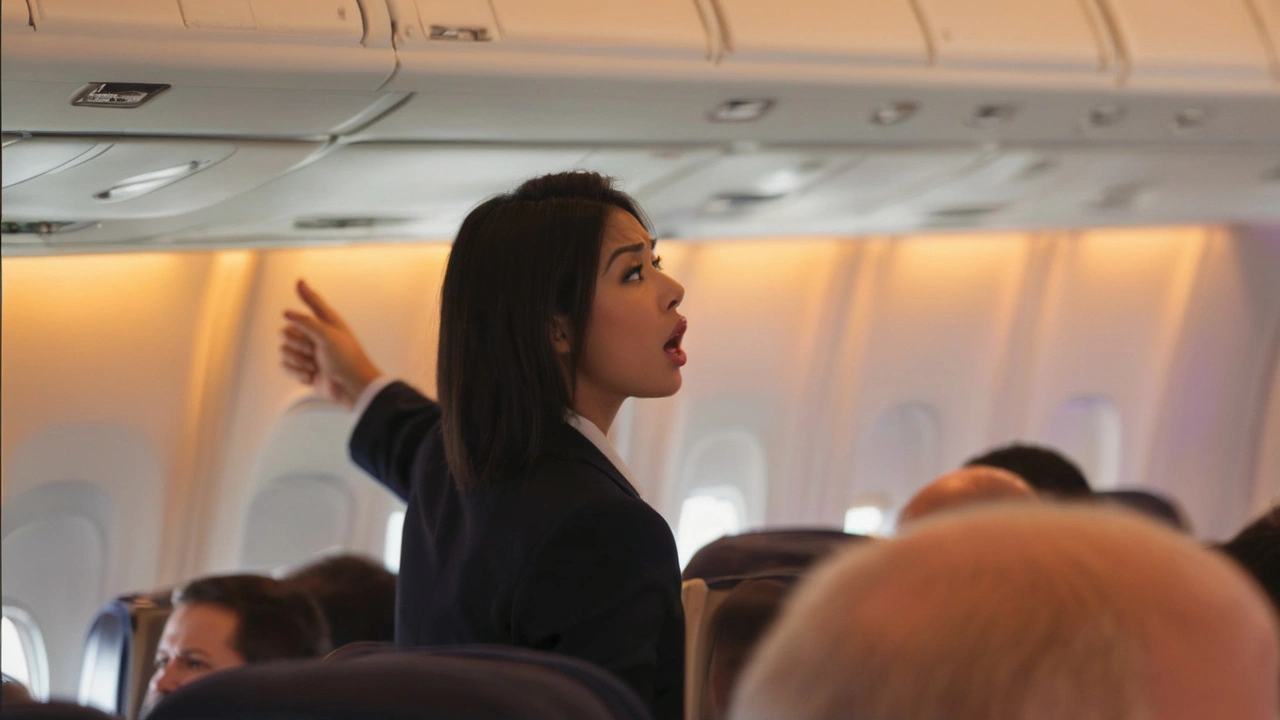Air Canada Flight Canceled After Cabin Crew's Meltdown Before Take-Off
An Air Canada flight bound for Montreal faced an unprecedented delay and eventual cancellation due to a heated altercation between a flight attendant and a passenger. This unforeseen disruption transpired on the runway, taking place on Flight AC73 departing from Casablanca, Morocco. What started as a seemingly minor disagreement quickly escalated into a full-blown conflict that resulted in severe repercussions for all onboard.
The Blanket That Sparked a Storm
The heart of the matter revolved around a blanket - a standard amenity provided to passengers for comfort during their journey. For reasons unknown, the flight attendant found herself embroiled in an argument with one of the passengers regarding this blanket. The specifics of how the dispute originated remain unclear, but it soon became apparent that the situation was deteriorating rapidly.
Proceeding to scold the passenger in both French and English, the cabin crew member's frustration reached its peak. Her threats to call the police and have the passenger removed from the flight marked a severe deviation from the expected conduct for airline staff. Reportedly, she sternly warned, "You will behave or we will get off I'll tell the captain right away. Yes or no?" which only added fuel to the fire. When fellow passengers suggested involving the captain to de-escalate the situation, the attendant dismissed their requests, continuing to shout commands like, "Everyone behave. Be quiet or you're getting off."
Social Media Reaction: Viral Footage
The incident did not just remain confined to the cabin. Several passengers documented the event on their smartphones. Soon after, the footage made rounds on social media, going viral almost instantaneously. The video clips stirred widespread attention and speculation, drawing both criticism and concern from viewers worldwide.
The power of social media has once again illuminated an incident that might otherwise have been quietly managed and forgotten. Public opinion became strongly divided. While some commenters felt the flight attendant's actions were overly harsh and unprofessional, others speculated that circumstances leading up to the altercation might have been stressful for the crew, warranting a sympathetic approach. However, consensus leaned towards the need for better handling of such situations by airline staff.
Air Canada's Official Response
In response to the unfolding situation, Air Canada swiftly intervened. The airline confirmed that the scheduled departure was canceled and an alternative crew was arranged to eventually transport the affected passengers to their intended destination. Notably, the flight was canceled entirely following the incident, emphasizing the seriousness with which Air Canada viewed the matter.
Christophe Hennebell, a spokesperson for Air Canada, expressed profound regret over the incident. He remarked that the airline takes such occurrences very seriously and is conducting a thorough review to ascertain all facts. "We apologize to our passengers for the experience falling short of their expectations," stated Hennebell. Such an apology underscores the airline's commitment to maintain service standards and address discrepancies rigorously.
Compensation and Future Measures
Air Canada made a clear commitment to ensuring that the passengers affected by the delay receive appropriate compensation. This encompasses refunds and in some cases, additional benefits that acknowledge the inconvenience faced. The airline's responsiveness to compensating passengers is a bid to restore customer trust and reinforce their dedication to service quality.
Looking ahead, industry experts speculate that Air Canada, like many airlines, might leverage this incident to re-evaluate and strengthen their crew training protocols. Further emphasis on conflict de-escalation techniques and passenger interaction strategies are likely to be prioritized. Ensuring that cabin crew can effectively manage high-stress situations while maintaining professionalism is a critical aspect of airline operations.
Passenger Rights and Airline Accountability
This incident shines a spotlight on broader themes of passenger rights and airline accountability. In an age where air travel is both common and essential, the standard of care provided to passengers has never been more scrutinized. Regulatory bodies and consumer advocacy groups are likely to observe such incidents closely, pressing for higher transparency and stricter guidelines when it comes to passenger treatment.
Moreover, the role of social media in amplifying such occurrences cannot be understated. As passengers continue to wield their smartphones as potent tools of advocacy and exposure, airlines are under increased pressure to not just manage, but exceed customer service expectations. An isolated incident, when captured and disseminated broadly, can have far-reaching implications for an airline’s reputation.

Conclusion
The Air Canada incident from Casablanca is a clear reminder of the delicate balance that airline staff must maintain in providing service while managing conflicts. Although human error and lapses in judgment are inevitable, the responsibility to uphold decorum and professionalism remains paramount. As Air Canada continues to address and learn from this episode, it is hoped that such measures will pave the way for smoother, more respectful interactions between crew and passengers in future flights.

Debbie Billingsley
July 31, 2024 AT 23:06Air Canada must uphold the highest standards of professionalism; no crew member should jeopardize the reputation of a Canadian carrier. The incident demonstrates a failure in discipline that cannot be ignored. Passengers deserve consistent, courteous service regardless of the circumstances. Strict corrective measures are essential to restore confidence.
Patrick Van den Berghe
August 1, 2024 AT 01:53That blanket drama was a waste of everyone's time.
Josephine Gardiner
August 1, 2024 AT 04:40While the incident attracted considerable public attention, it also underscores the delicate balance required in passenger‑crew interactions. It is imperative that airlines review their de‑escalation protocols to prevent similar occurrences. Observers hope that systematic improvements will be implemented.
Jordan Fields
August 1, 2024 AT 07:26Air Canada should expedite compensation for affected travelers. The airline must also reassess crew training standards. Prompt action will mitigate reputational damage.
Divyaa Patel
August 1, 2024 AT 10:13Behold the absurd theater that unfolded over a humble blanket, a piece of nylon turned into a catalyst for chaos.
The scene was less a simple quarrel and more a grotesque ballet of ego, authority, and misguided fury.
Every shouted command echoed like a gunshot across the cabin, reverberating through the collective patience of travelers.
Passengers, once serene, were thrust into a vortex of tension, their faces contorted in bewildered disbelief.
One could almost hear the silent lament of the blanket, yearning for a simple purpose: to provide warmth.
Instead, it became a flag of rebellion, waved by a stewardess whose frustration spiraled beyond the bounds of decorum.
The attendant's threats-'behave or you’re getting off'-read like a tyrant's decree, stripping away the civility airlines swear to uphold.
Such bravado, masquerading as discipline, only inflames the very unrest it purports to quell.
In the age of smartphones, the world witnessed this farce in real time, each shaky recording amplifying the outrage.
The virality was inevitable, for humanity craves spectacle, especially when it exposes the fragility of institutional control.
Air Canada's response-cancellation and apologies-offers a veneer of responsibility, yet the wound remains raw.
Compensation may soothe the bruised egos of passengers, but it cannot stitch the torn fabric of trust.
Future training programs must embed genuine empathy, not merely procedural scripts.
Only by teaching crew members to breathe, listen, and de‑escalate can airlines prevent such melodramas from recurring.
Let this incident be a clarion call, a reminder that even the smallest comforts can ignite the fiercest tempests when mismanaged.
Larry Keaton
August 1, 2024 AT 13:00Look, folks, we all gotta look out for each other, even when tempers flare. It’s definatly not cool to watch a simple blanket become a battlefield. The crew could’ve handled it better, but yall deserve respect and a smooth ride. Let’s push for real de‑escalation training so we ain’t stuck in this mess again.